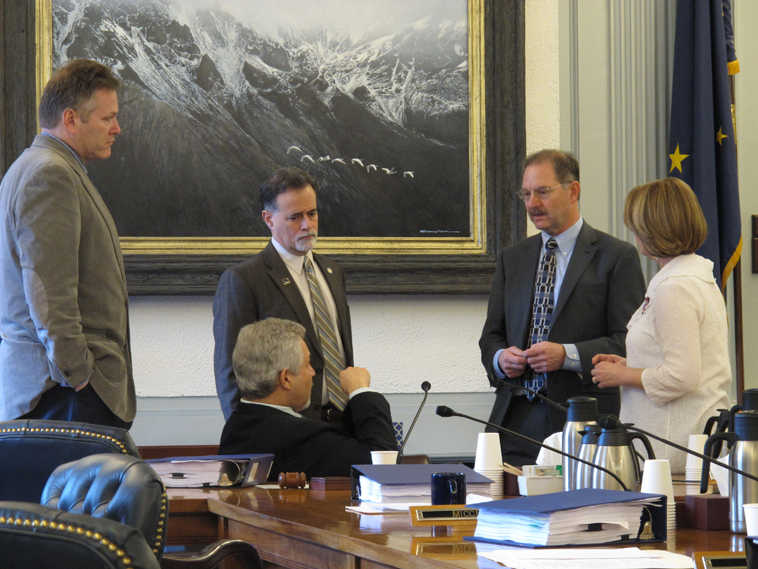JUNEAU — The Senate Finance Committee has advanced an operating budget for Alaska that would not forward-fund public education and aims to prevent Gov. Bill Walker from taking any unilateral action to expand Medicaid.
The bill advanced late Thursday afternoon and could get a Senate vote as early as Friday.
Sen. Click Bishop, a former state labor commissioner, unsuccessfully sought to rescind language the committee adopted Wednesday that seeks to eliminate pay raises for public employees next year.
Committee co-chairs Pete Kelly, R-Fairbanks, and Anna MacKinnon, R-Eagle River, said these are hard times. The state is facing projected multibillion-dollar deficits amid low oil prices. Cuts alone are seen as virtually impossible to fill the deficit, but the focus at the Capitol has been on making cuts and reducing the size of state government before looking at additional sources of revenue.
The state is expected to dip into savings to help cover its costs, but lawmakers and Walker want to extend Alaska’s reserves as long as possible.
If the House does not agree with the budget that passes the Senate — a likely outcome — the budget will go to a conference committee, with House and Senate negotiators tasked with hashing out differences between the two chambers’ proposals.
On education, the House version of the budget stuck with Walker’s proposal to advance-fund public education for fiscal year 2017 at 90 percent. The Senate Finance version removed the forward funding for 2017 and cut $47.5 million in school funding for the coming year. That would be on top of cuts proposed to the state education department.
The Senate committee’s proposal also assumes that $32 million in one-time education money for next year will be cut. Last session, the Legislature approved $32 million in one-time funds for next year and about $20 million for 2017. Walker previously proposed cutting those one-time funds, a move that’s pending in a separate, supplemental budget.
“It’s heartbreaking how it will affect kids. Our state is better than this,” said Alyse Galvin of the organization Great Alaska Schools.
Kelly told reporters education cannot be immune to cuts because it’s such a large part of the budget. If cuts are only made to day-to-day agency operations, “we can never get to cuts large enough to actually impact our reserves in a positive way,” he said.
The Senate Finance Committee’s plan also includes language saying federal funds for Medicaid expansion could not be accepted or spent without an “acceptable” plan for reform and an appropriation approved by the Legislature.
Walker has made Medicaid expansion a priority and introduced a bill, at legislators’ prodding, aimed at expansion and reform. He has said he wants to work through the legislative process. Kelly, who has a bill focused on reform, said the language stakes out the position that lawmakers do not want the governor to take any unilateral action.
The version also has language putting on hold for one year a program that pays certain Alaska ports a share of the cruise ship passenger tax collected by the state. MacKinnon raised concerns with overspending of the funds and proposed the hold to allow for accurate accounting.
Sen. Bert Stedman, R-Sitka, said in an interview he’s hoping to get that provision struck. Funds from the tax must be spent on port facilities, harbor infrastructure and other services provided to commercial passenger ships and their passengers.
The challenge in turning off the program, Stedman said, is that communities have projects underway and debt to repay. If changes are needed, they should be looked at with involvement from the communities and cruise industry, he said.

